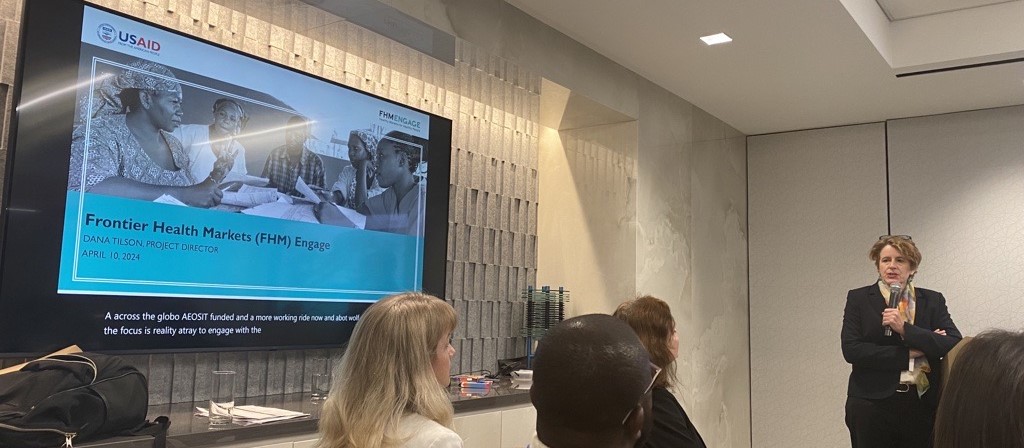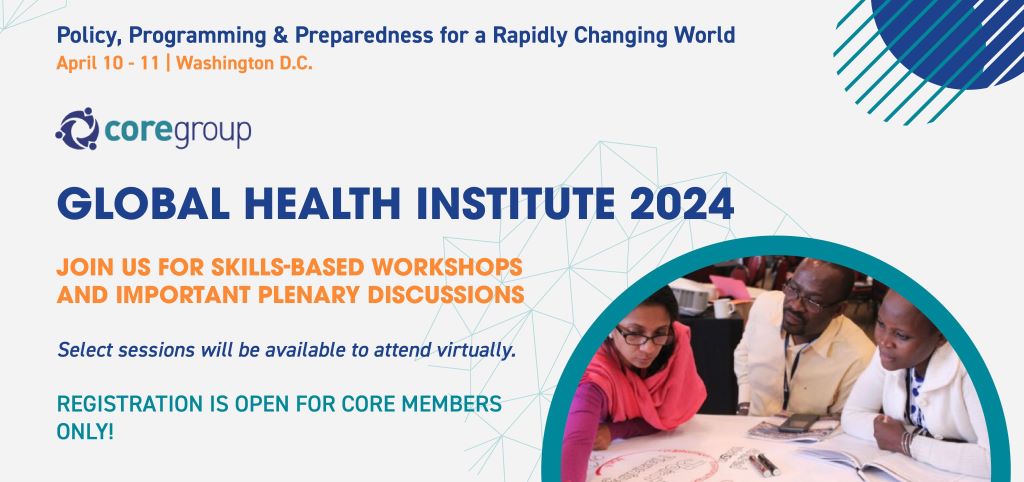
FHM Engage Presents at CORE Group Global Health Institute
Our rapidly changing and evolving world is facing challenges from disease outbreaks, climate change, and social, political, and economic impacts on women, children, and adolescents' health. Succeeding in this dynamic environment demands a multi-stakeholder approach and a deep understanding of local context and how it links to global policy. Policy and programming alignment is needed to build sustainable health systems at the national and community levels to deliver essential community health package of health services, advance equity and inclusion and achieve primary health care (PHC) for all.
On April 10, the CORE Group Global Health Institute hosted a plenary to hear from policy leaders and technical experts on shifts in policy and technical updates to meet global challenges and address the most pressing health needs. Before an audience that included CORE Group members and participants from implementers, civil society, health professional associations, youth groups, private sector, UN agencies, academia, and donor agencies, speakers emphasized the necessity of adopting an integrated approach to policy-making that underscores the interconnectedness of health challenges. They also highlighted the need for policies to be designed to foster synergy across various sectors, recognizing the interplay between disease outbreaks, climate change, conflicts, localization, and social determinants of health. Among other themes, speakers shared their unique insights on how policies can be tailored to local contexts while ensuring programmatic integrity, using scientific evidence. Speakers proposed actionable policy recommendations for advancing equity and inclusion in healthcare delivery, including strategies to dismantle systemic barriers, promote localization, and gender-responsive policies, and empower communities through participatory decision-making processes.
During a panel on “Policy and Programming in a Rapidly Changing World,” our FHM Engage Project Director Dana Tilson joined panelists from USAID, GAVI, the Global Health Council, and other relevant CORE Group members to speak about some of FHM Engage’s initiatives working with governments and local partners and involving the private sector to strengthen local health market systems and improve equal access to health products and services.
Here are notes from the FHM Engage portion of the event:
Question posed to FHM Engage Project Director Dana Tilson: USAID's Frontier Health Markets (FHM) Engage seeks to strengthen local health market systems involving the private sector and improving equal access, while working with governments and local partners. Can you speak to some of the successes with the project and how you overcame the challenges?
Response: Despite progress over the past few decades, millions of women around the world still lack access to modern contraceptive methods. This not only impacts their ability to plan their families but also affects their health and well-being. Unintended pregnancies can lead to unsafe abortions, maternal mortality, and a cycle of poverty that is difficult to break.
USAID's Frontier Health Markets Engage project seeks to strengthen local health market systems involving the private sector and improve equal access to family planning.
One of the successes of the project is its market development approach. FHM Engage recognizes that the private sector plays a crucial role in delivering healthcare services, including family planning. In many countries, more than 50 percent of family planning products and services are provided in private sector pharmacies and clinics. As such, the project has worked to strengthen the capacity of private healthcare providers and market systems and create an enabling environment for them to deliver high-quality family planning services.
Through the market development approach, we first seek to understand the private sector market for family planning or maternal and child health by looking at the core market functions of supply and demand for contraceptive products and services and identifying the root causes of why there may be supply or demand barriers. Then we look at the whole market system at the enabling environment including policy, regulations, stewardship of the market, financing constraints and market information and identify those areas that are inhibiting the private sector from delivering quality affordable products and services.
An example of the innovations coming out of this approach is the family planning marketplace that was just launched by our team in India called the Women’s Health and Livelihood Alliance. In this marketplace we have integrated health and family planning into a women’s livelihood program, where we connect investors to solution providers who are proving contraceptive information and services to young women. We intervene all the way along the value chain from contraceptive manufacturers who want to increase local domestic sales of oral contraceptive pills, to pharmacy outlets through digital aggregators, to demand generation using the latest digital interventions who make referrals to connect clinics and pharmacies. WOHLA engages with government and private sector to advocate for change in contraceptive policy and regulation to enable expansion of the private sector contraceptive market.
This approach has helped to expand access to family planning services, particularly to young women in underserved areas.


